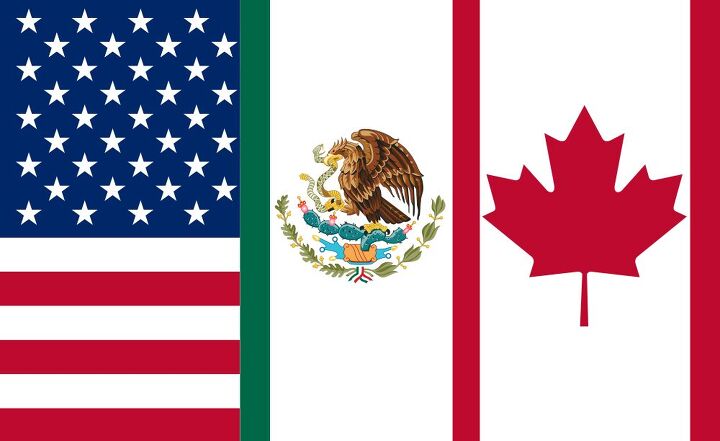Trade War Watch: NAFTA Window Almost Closed, Canada Still Isn't Interested

The United States is getting extremely close to having to move forward on its NAFTA deal with Mexico without Canada, according to White House economic adviser Kevin Hassett.
“I’m a little surprised that the Canadians haven’t signed up yet,” Hassett said in an interview with Fox News. “I worry that politics in Canada is trumping common sense because there’s a very good deal that was designed by Mexico and the U.S. to appeal to Canada. And they’re not signing up and it’s got everybody over here a little bit puzzled.”
On Thursday, Canadian Foreign Minister Chrystia Freeland and U.S. Trade Representative Robert Lighthizer met in Washington to discuss terms. However, no agreement was reached.
“We discussed some tough issues today, the atmosphere continues to be constructive, and we continue to work hard towards a deal,” Freeland told the media. “I chose my words carefully: Today we discussed some tough issues, the conversation was constructive.”
Trump struck a side-deal with Mexico last month and has begun threatening to exclude Canada if it won’t agree to his terms. He also said he might impose a 25 percent duty on Canadian auto exports, possibly simply to rattle negotiators into playing ball.
Canada is seeking some kind of guarantee that, if a deal is reached with the United States, it won’t include those lofty auto tariffs. According to Bloomberg, Unifor President Jerry Dias, head of the union representing Detroit Three autoworkers north of the border, hung around the meeting to talk to the press about it. He said an agreement without a no-tariff assurance would be foolish, adding that Canadians aren’t stupid.
“Why would Canada sign a trade agreement that deals with all the important issues and then have Donald Trump impose a 25 per cent tariff on automobiles?” Dias asked reporters while trade discussion progressed between Freeland and Lighthizer.
It’s a good question, but may be one the United States is less interested in seeking an answer for anymore. Hassett says a standalone deal with Mexico is right around the corner, in which case NAFTA is effectively over if an agreement can’t be reached with Canada before October 1st.
It’s another self-imposed target that could go ignored but the U.S. seems steadfast in its adherence to it. While previous deadlines have passed during the arduous, year-long negotiations aimed at revising NAFTA, pressure on Canada to sign a deal has never been higher. While asking for quite a bit initially, America has repeatedly rolled back its demands and now wants to push something through Congress before Mexico’s new government takes office on December 1st of this year.
Meanwhile, reports have come in that U.S. negotiators want Canada cap its auto exports to the United States at 1.7 million vehicles a year. However, industry sources have said such a cap has not been officially discussed and would be deemed unacceptable anyway. Mexico’s deal is rumored to cap tariff-free or nearly duty-free Mexican imports to the United States at 2.4 million vehicles. Canada currently sends the U.S. roughly 2 million vehicles annually.
[Image: NAFTA Secretariat]

A staunch consumer advocate tracking industry trends and regulation. Before joining TTAC, Matt spent a decade working for marketing and research firms based in NYC. Clients included several of the world’s largest automakers, global tire brands, and aftermarket part suppliers. Dissatisfied with the corporate world and resentful of having to wear suits everyday, he pivoted to writing about cars. Since then, that man has become an ardent supporter of the right-to-repair movement, been interviewed on the auto industry by national radio broadcasts, driven more rental cars than anyone ever should, participated in amateur rallying events, and received the requisite minimum training as sanctioned by the SCCA. Handy with a wrench, Matt grew up surrounded by Detroit auto workers and managed to get a pizza delivery job before he was legally eligible. He later found himself driving box trucks through Manhattan, guaranteeing future sympathy for actual truckers. He continues to conduct research pertaining to the automotive sector as an independent contractor and has since moved back to his native Michigan, closer to where the cars are born. A contrarian, Matt claims to prefer understeer — stating that front and all-wheel drive vehicles cater best to his driving style.
More by Matt Posky
Latest Car Reviews
Read moreLatest Product Reviews
Read moreRecent Comments
- Theflyersfan I always thought this gen XC90 could be compared to Mercedes' first-gen M-class. Everyone in every suburban family in every moderate-upper-class neighborhood got one and they were both a dumpster fire of quality. It's looking like Volvo finally worked out the quality issues, but that was a bad launch. And now I shall sound like every car site commenter over the last 25 years and say that Volvo all but killed their excellent line of wagons and replaced them with unreliable, overweight wagons on stilts just so some "I'll be famous on TikTok someday" mom won't be seen in a wagon or minivan dropping the rug rats off at school.
- Theflyersfan For the stop-and-go slog when sitting on something like The 405 or The Capital Beltway, sure. It's slow and there's time to react if something goes wrong. 85 mph in Texas with lane restriping and construction coming up? Not a chance. Radar cruise control is already glitchy enough with uneven distances, lane keeping assist is so hyperactive that it's turned off, and auto-braking's sole purpose is to launch loose objects in the car forward. Put them together and what could go wrong???
- Jalop1991 This is easy. The CX-5 is gawdawful uncomfortable.
- Aaron This is literally my junkyard for my 2001 Chevy Tracker, 1998 Volvo S70, and 2002 Toyota Camry. Glad you could visit!
- Lou_BC Let me see. Humans are fallible. They can be very greedy. Politicians sell to the highest bidder. What could go wrong?


































Comments
Join the conversation
I do believe as the rhetoric dies down we will come to a trade agreement with Canada. Inequities in trade have been ignored in the past and the US has many times got the short end of the stick. Chrystia Freeland has kept the talks open and I believe she sincerely wants to work out an amicable agreement. I remember seeing her on the Sunday morning talk shows such as This Week and she always made very sensible level headed statements and her discussions with other panel members were good. In this case it would be better to leave out comments from Trump and Trudeau because they are not helping to move forward to an agreement.
@the laine--Many voters resented the fact that Clinton ignored their concerns about immigration and felt that she was more concerned about the rights of some individuals to use the bathroom of their choice. I felt that that was a non-issue to me and that either way I felt that there were more pressing issues. Many felt that they were being labelled racists when they had legitimate concerns. Sure there are racists and those people will most likely never change but most people are not and they get frustrated and angry when they feel they are not being heard. On paper Clinton had the qualifications but she came across negatively. I did not vote for Trump as well and I still have my reservations about him but he is our President. I do like some of the changes that have happened but I wish the President was more restrained in his statements and tweets. I do feel that we need to come to an agreement with Canada because of the number of jobs that would be effected and that is not only in the auto industry. If it takes a longer period of time to come to an agreement then so be it as long as it is a win win for both countries.